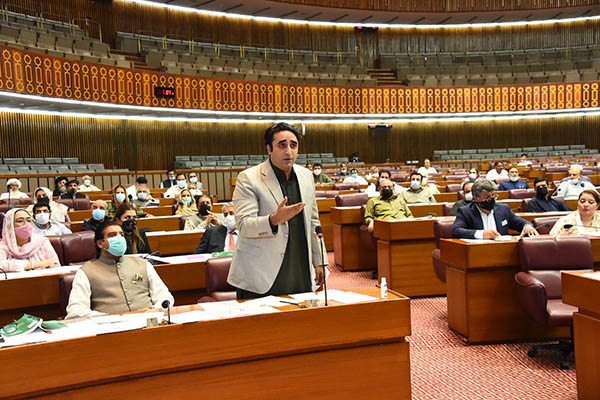
Courtesy National Assembly of Pakistan
Contentious National Assembly session passes laws, including one aimed at giving foreign convicts right to appeal and granting online voting rights to overseas Pakistanis
The Pakistan Tehreek-e-Insaf-led government on Thursday passed 21 laws in the National Assembly despite an opposition boycott that marked a particularly contentious session of the Lower House of Parliament.
At the commencement of the session, opposition members pointed out lack of quorum to Speaker Asad Qaiser, but he dismissed their call to adjourn the proceedings. PPP Chairman Bilawal Bhutto-Zardari, speaking on the floor of the House, questioned why the government sought to legislate through ordinances instead of debating proposed laws in Parliament. “If you want a consensus, talk to us and don’t bring ordinances in the dark of night,” he said. “You were advocating the case of Kashmiris and now that of Kulbhushan?” he added, in reference to a bill that grants foreign convicts right to appeal if they have been sentenced by military courts.
The PPP leader stressed that all legislation should come about as a result of mutual understanding. “The problems of people will be not be solved if you don’t listen to us, don’t allow us to speak and don’t even give us the right to read your bill,” he said.
He also discussed a bill seeking to grant internet voting rights to overseas Pakistanis by questioning what their constituency was. “Overseas Pakistanis should not contest against us but with each other,” he said, suggesting that they should have their own special constituencies. Similarly, PMLN’s Ahsan Iqbal, PPP’s Raja Pervez Ashraf and JUIF’s Shahida Akhtar Ali slammed the proposed electoral reforms bills as “one-sided.”
Responding to the opposition, Foreign Minister Shah Mahmood Qureshi fell back on the incumbent government’s routine policy of branding dissent and debate as a foreign conspiracy. “India also wants Pakistan not to abide by the decision of the International Court of Justice and the opposition also wants this,” he claimed. “Overseas Pakistanis work hard and send money to the country. We are giving them the right to vote. They [opposition] want to deprive Pakistanis abroad of the right to vote,” he added.
Law Minister Farogh Naseem, likewise, said that the ICJ had issued directions for introducing the law on appeal.
The laws passed by the government, which still require passage in the Senate, are as follows:
- Election (Amendment) Bill 2020 – introduced on Oct. 16, 2020, the bill seeks greater financial autonomy for the Election Commission of Pakistan; delimitation on the basis of voters, rather than population; preparation of electoral rolls through NADRA data; increase in nomination fee; vacating of any seat where a candidate has not taken oath of office within 60 days of first sitting; online voting rights for overseas Pakistanis; open ballot in Senate polls
- Elections (Second Amendment) Bill 2020 – seeks free, fair, and transparent elections through the use of technology
- International Court of Justice (Review and Reconsideration) Bill 2020 – seeks to provide the right of review and appeal for foreign convicts sentenced by military courts. This bill is targeted at allowing convicted Indian spy Kulbhushan Jadhav the right to appeal his death sentence
- Financial Institutions (Secured Transactions) (Amendment) Bill 2021
- Port Qasim Authority (Amendment) Bill 2021
- Pakistan National Shipping Corporation (Amendment) Bill 2021
- Gwadar Port Authority (Amendment) Bill 2021
- Regulation of Generation, Transmission and Distribution of Electric Power (Amendment) Bill 2021
- Anti-Rape (Investigation and Trial) Bill 2020
- Mutual Legal Assistance (Criminal Matters) (Amendment) Bill 2021
- Federal Medical Teaching Institutes Bill 2020
- National Institute of Health (Re-organization) Bill 2020
- Maritime Security Agency (Amendment) Bill 2021
- COVID-19 (Prevention of Hoarding) Bill 2020
- SBP Banking Services Corporation (Amendment) Bill 2020
- Corporate Restructuring Companies (Amendment) Bill 2021
- Companies (Amendment) Bill 2021
- Pakistan Academy of Letters (Amendment) Bill 2021
- Muslim Family Laws (Amendment) Bill, 2020] (Section 4)
- Muslim Family Laws (Amendment) Bill, 2020] (Section 7)
- Criminal Law (Amendment) Bill 2021 – seeks to enforce chemical castration of exceptional first offenders and repeat offenders
The government also introduced three new bills, which were referred to the relevant committees for consideration: The Pakistan Allied Health Professionals Council Bill 2021; the Pakistan Nursing Council (Amendment) Bill 2021 and the Mutual Legal Assistance (Criminal Matters) (Amendment) Bill 2021.
